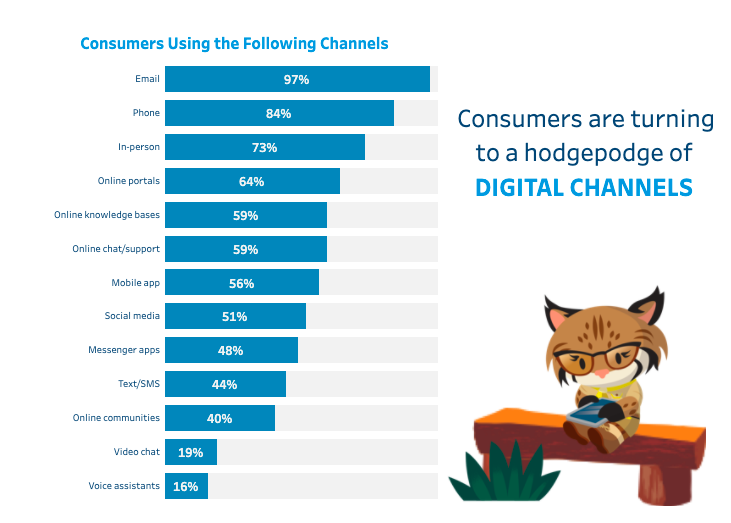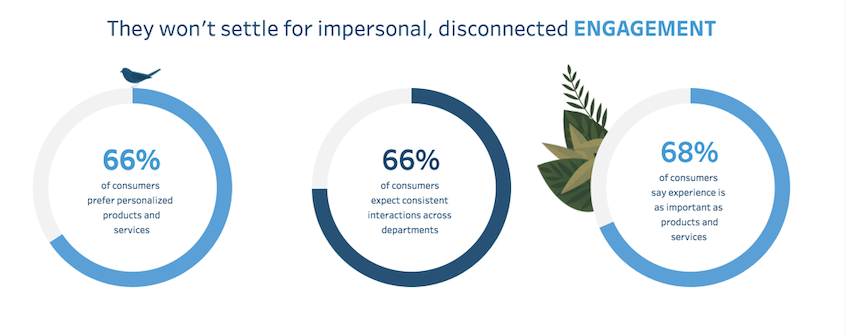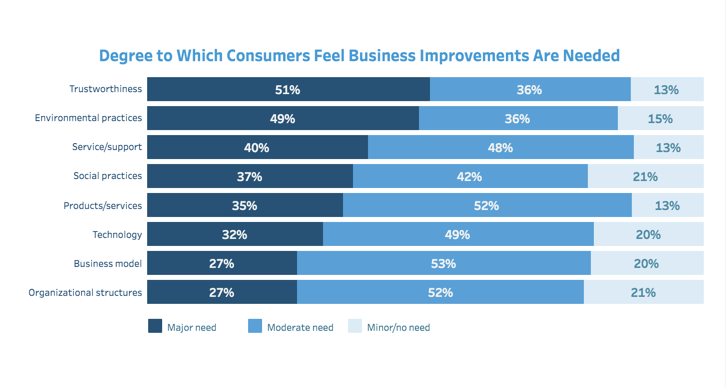Explore key insights from the Salesforce State of the Connected Customer Report, 4th Edition.
Global market landscapes have changed beyond recognition with economic, health, leadership, social justice, and climate crises dominating worldwide headlines. As a result, the customer journey, expectations, and behaviours have transformed with unprecedented scale and speed.
In our recent State of the Connected Customer Report, more than 15,000 customers and business buyers worldwide revealed several key insights. In this blog, we will analyse their responses regarding connected customer experiences, global customer expectations, and the importance that consumers place on company values worldwide and in Belgium.
At Salesforce, we see these evolving customer expectations as an opportunity to innovate and are pleased to share insights to support this evolution. The need for businesses to reassess and reinvent is clear as customers and businesses are demanding more from corporations across the globe.
For example, 71% of customers agreed that they pay more attention to companies’ values than they did a year ago. Business buyers have an even stronger correlation with values. In fact, 75% of business buyers agree that vendors’ ethics increasingly factor into their purchasing decisions.
How do you build trust and create exceptional experiences for connected customers?
Below, we explore both the key global market trends and the experience in Belgium as viewed through the lens of our fourth State of the Connected Customer report.
Consumers crave authentic connections
Unprecedented digital transformation throughout 2020 has been a catalyst for reflection and one thing has become crystal clear: connected consumers value their brand relationships and experiences. As customers stepped back and began to reset and rethink, they also reassessed and revised their buying behaviours.
In addition to the digital-first dynamic that characterises much of the new normal, customers are demanding authenticity from their relationships with companies. They are not just seeking more personalised experiences, but empathetic ones.
The role of customer service has evolved from merely addressing acute issues to fostering a sense of care. This approach provides an opportunity for companies to leverage every interaction to nurture and build customer relationships.
Globally, there is work to be done both in reimagining service provision and innovative thinking. The majority of global customers (54%) believe companies should expand customer engagement methods as well as offer new products and services in response to COVID-19. Moreover, 69% expect existing products and services to evolve through new channels and formats, namely digital versions of traditionally in-person experiences.
Creating superior customer experiences
Consumers are challenging companies to deliver superior customer experience, and in more formats than ever before in return for customer loyalty. The craving for innovation and opportunity for expanded channels in socially distant times is even more prevalent among younger generations, providing an important glimpse into the expectations of the customer of the future.
So what are the markers of superior customer experiences? Not surprisingly, service that is personalised, seamless, and fast makes the list, with convenience remaining king. Unfortunately, customer expectations far exceed their perceptions of a business's ability to deliver, with companies falling significantly short.
“66% of customers responded in this year’s survey that they feel treated like a number.”
Understanding the value customers place on personalisation and providing tailored options combined with the continuity of experience between different channels has the potential to be an incredible differentiator.
Artificial Intelligence presents options to deliver this differentiation, however at the same time presenting a conundrum for businesses, as only 48% of customers trust companies to use AI ethically, and as we know, trust is vital.
Key insights for Belgium
Some of the most important challenges for marketers in Belgium are:
insufficient organisational structure and processes,
engaging customers in real-time,
creating cohesive customer journeys across channels and devices.
When looking at the State of the Connected Customer Report customers in Belgium value the digital experience as evidenced by email, phone, and online chat support emerging as their top channels. However, how these channels are used by Belgium differs from the worldwide view slightly.
Customers in Belgium are more reliant on email (97%) and phone service (84%) as their primary channels of communication.
In-person is less popular with Belgium customers, 73% of whom use this channel versus 79% of global respondents.
Customers in Belgium use online portals and knowledge bases, social media, mobile apps, messenger apps, and SMS less than their global counterparts, but these channels are still expected by varying segments of the population.
Discover more insights on the top marketing trends in Belgium.
As is the case globally, in the new economy channel variety that supports a great service experience for customers — trusted, empathetic, and convenient — is the way to drive differentiation. Meeting these expectations in Belgium will be no easy feat, requiring new strategies and innovation.
Especially cross-channel strategies that deliver consistency from salespeople, customer service agents, and other individuals contributing to the customer experience.
Consumers’ perception of your values impacts customer retention and acquisition
More than simply providing product and service excellence, customers increasingly expect companies to demonstrate social good in order to win their loyalty. Considering that 61% of customers report having stopped buying from a company whose values did not align with their own, company values need to be clearly understood and communicated across channels to support customer assessments.
With a variety of societal issues impacting customer buying behaviour, there’s no shortage of topics to include in company sales techniques and content strategies.
The belief that companies have a duty to more than simply shareholders, to behave ethically and be worthy of societal trust, isn’t new. However, the criticality of trust is magnified through the lens of continued crises. In this environment, customers aren’t simply putting more emphasis on trust, but they are also setting a higher bar for companies to earn that trust.
As the positions of companies face greater public scrutiny, transparency and advanced customer engagement are demanded. And as global attitudes shift companies must face the realisation that what they stand for, rather than simply what they make and how they deliver it, is likely to determine whether or not existing customers choose to continue their relationships with a brand and whether or not potential new customers choose to start a relationship.
Connected customer experiences require action
In a time when individuals have come together worldwide to show support for movements from across political spectrums, the global community is clear — more than words, action is demanded. A whopping 90% of global customers expect a clear demonstration of companies’ values, with 89% having an expectation that companies clearly state those same values.
In Belgium, 49% of customers think that the business community has a major need to improve environmental practices.
With that in mind, communications that make clear companies’ values and positions, and more than that, those that detail the actions that companies take aligned to their values, are critical. This helps when working on customer loyalty and retention in particular.
In fact, 78% of global customers express that 2020’s crises should be a catalyst for improving the multi-channel expression of values. Companies must overhaul everything from how they operate and engage within their environment, to the ways that they contribute to the communities where they exist. Sweeping change is demanded.
Collectively, individuals have come to understand the power they wield as consumers and business buyers. They are flexing their muscles to build the kind of world they want to live in. Currently, 55% of global customers believe they have the power to influence change in companies. We can expect to see that number rise in years to come.
As younger generations of customers gain more market share, company values and actions will become even more important to the bottom line, as these customers will assess their options based on the degree to which they believe companies are acting in the best interest of their communities, neighbours, and environment — among other things.
Summary
Currently, 86% of global customers agree that the societal role of companies is changing, and 90% believe that how a company acts during a crisis demonstrates its trustworthiness.
Now is the time for evolution. As customers and businesses demand more, the organisations that will thrive are those who can pivot, clearly state, and demonstrate their values building trust and nurturing customer relationships in the next normal.
Are you up for the challenge?












